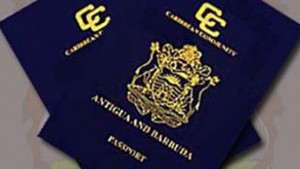 Government is being warned that the high number of people accessing the Citizenship by Investment Programme (CIP) through the National Investment Fund (NIF) option could devalue the country’s passport.
Government is being warned that the high number of people accessing the Citizenship by Investment Programme (CIP) through the National Investment Fund (NIF) option could devalue the country’s passport.
Economist McCarthy Marie and Political Analyst Arvel Grant made the comments after Prime Minister Gaston Browne’s revelation that of the 510 passports issued under the CIP since its inception, 416 were issued under the NIF, 89 were under the Real Estate option, while only five were under the Business Investment area.
Under the NIF option, the applicant is required to make a contribution in the minimum sum of US$250,000 per application, in the form of a one-time payment.
“There is a world ranking on the power of passports to see how many countries one can get into without a visa. So, the most powerful passport is the one that gets you into the most countries without needing a visa …I can see a little problem there, where if too many people go for that (NIF) offer then the countries to which they can enter without visa, some of them will get nervous and might then require visas and then devalue the passport,” Marie said.
The economist said although government may hope the other CIP investment options would be chosen over the NIF, the reality is, many applicants under these programmes are usually seeking a passport with visa-free strength and other associated benefits.
He pointed to the situation where Dominican citizens are now required to have visas to travel to Canada.
This requirement, Marie said, arose after Canada became concerned that many Chinese were turning up in that country (Canada) with the Dominica passport, which they obtained through the CIP offered by that OECS country.
Marie said what makes Antigua & Barbuda’s NIF investment option more attractive, is that the applicants do not have to spend time in Antigua or build a house and this option is the cheapest of the four.
Grant, in turn, suggested that government has to find a way to make the other CIP application options more attractive to create a balance.
The political analyst, yesterday, told OBSERVER Radio’s Big Issues, “It is a market driven thing, and I think some point in time we may want to look at whether we need to do something else to incentivise the other options, aside from the uptake in terms of the contributions to the National Development Fund.”
He noted that the process of due diligence is something government has to keep control over, because one bad passport incident, could immediately change the value of the country’s passport.
Currently, to qualify for citizenship under the Real Estate option, the government requires applicants to make an investment in designated, officially approved real estate with a value of at least US$ 400,000 plus the payment of government processing fees and due diligence fees.
In addition, two or more applicants who have executed a binding sale and purchase agreement may apply jointly for citizenship by investment provided that each applicant contributes the minimum investment of US$ 400,000.
The Citizenship by Investment Unit (CIU) shall, after consultation with the Antigua & Barbuda Investment Authority (ABIA) approve businesses, whether existing or proposed, for the purposes of investment in business under the CIP.
Another option is where a person proposes to make an investment in an approved business of at least US$ 1,500,000 on their own behalf.
The fourth investment option, where at least two persons propose to make a joint investment in such an approved business totalling at least US$ 5,000,000, and each of those persons proposes to contribute at least US$400,000 to the joint investment, an application or application for CIP may be submitted on his, her or their behalf through an agent.
